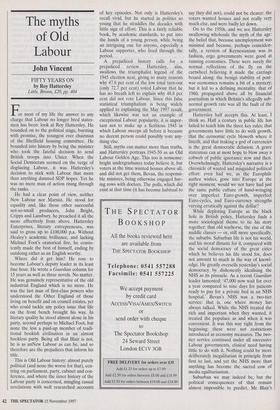The myths of Old Labour
John Vincent
FIFTY YEARS ON by Roy Hattersley Little, Brown, £20, pp. 404 For most of my life the answer to any charge that Labour no longer bred states- men has been: look at Roy Hattersley. He bounded on to the political stage, bursting with promise, the youngest ever chairman of the Sheffield housing committee. He bounded into history by being the minister who took the fateful decision to send British troops into Ulster. When the Social Democrats seemed on the verge of displacing Labour, it was Hattersley's decision to stick with Labour that more than anything damned SDP hopes. Yet he was no mere man of action rising through the ranks.
He had a clear point of view, neither New Labour nor Marxist. He stood for equality and, like those other successful not-so-small producers, John Bright, Cripps and Lansbury, he preached it all the more effectively from above. Hattersley Enterprises, literary entrepreneurs, was said to gross up to £100,000 p.a. Without Healey's academic brilliance, and lacking Michael Foot's oratorical fire, he consis- tently made the best of himself, ending by outdoing either as an English worthy.
Where did it get him? He rose to become Labour's deputy leader in its least fine hour. He wrote a Guardian column for 15 years as well as three novels. No matter. He was genuinely representative of the old industrial England which is no more. He was the last man of first-class powers who understood the Other England of those living on benefit and on council estates, yet who could tackle any policy issue that life on the front bench brought his way. In literary quality he stood almost alone in his party, second perhaps to Michael Foot, but none the less a paid-up member of tradi- tional bookish civilisation in an almost bookless party. Being all that Blair is not, he is as unNew Labour as can be, and so therefore are the prejudices that inform his title.
This is Old Labour history: almost purely political (and none the worse for that), cen- tring on parliament, party, cabinet and con- ference, and where the inner history of the Labour party is concerned, mingling casual revelations with well researched accounts of key episodes. Not only is Hattersley's recall vivid, but he started in politics so young that he straddles the decades with little sign of effort. This is a fairly reliable book, by academic standards, to put into the hands of a young person, while being an intriguing one for anyone, especially a Labour supporter, who lived through the period.
A prejudiced history calls for a prejudiced review. Hattersley, alas, swallows the triumphalist legend of the 1945 election neat, giving so many reasons why 47.8 per cent of the low total turn-out (only 72.7 per cent) voted Labour that he has no breath left to explain why 48.8 per cent did not vote Labour. Since this false statistical triumphalism is being widely applied to explaining the May 1997 result, which likewise was not an example of exceptional Labour popularity, it is impor- tant not to make up a fictitious 1945 in which Labour sweeps all before it because no decent person could possibly vote any- thing else.
Still, myths can matter more than truths, and Hattersley portrays 1945-50 as an Old Labour Golden Age. This too is nonsense: bright undergraduates today believe it, but voters at the time wanted houses above all, and did not get them, Bevan, the responsi- ble minister, being otherwise engaged hav- ing rows with doctors. The polls, which did exist at that time (it has become habitual to say they did not), could not be clearer: the voters wanted houses and not really very much else, and were badly let down.
On to the 1950s, and we see Hattersley swallowing wholesale the myth of the age: the belief that, because unemployment was minimal and because, perhaps coinciden- tally, a version of Keynesianism was in fashion, ergo governments were good at running economies. These were surely the normal reflections of the fly on the cartwheel believing it made the carriage bound along: the benign stability of post- war economies remains a bit of a mystery; but it led to a defining mentality, that of 1960, propagated above all by financial journalism in which Britain's allegedly sub- normal growth rate was all the fault of the government.
Hattersley half accepts this. At least, I think so. Half a century in public life has failed to teach him the three key rules: that governments have little to do with growth, that the economic cycle bloweth where it listeth, and that making a god of currencies is the great democratic delusion. A grave statesman can at most hope to blow away a cobweb of public ignorance now and then. Overwhelmingly, Hattersley's narrative is a chronicle of wasted and misguided political effort: even had we, as the Europhile author wishes, gone into Europe at the right moment, would we not have had just the same public culture of hand-wringing over imperfect Euro-growth, imperfect Euro-cycles, and Euro-currency strengths varying erratically against the dollar?
While deploring Europe as the black hole in British policy, Hattersley finds a more sociological theme to tie his story together: that old warhorse, the rise of the middle classes — or, still more specifically, the suburbs. Suburban life is not his world, and his moral distaste for it, compared with the social democracy of the great cities which he believes his life stood for, does not amount to much in the way of knowl- edge. He greatly oversells yesterday's social democracy by dishonestly idealising the NHS as its pinnacle. As a recent Guardian leader lamented: '47,000 now wait for over a year compared to nine days for patients ready to pay for a private bed in an NHS hospital.' Bevan's NHS was a two-tier service: that is, one where money has always talked. While the NHS treated the rich and important when they wanted, it treated the populace as and when it was convenient. It was this way right from the beginning: these were not restrictions introduced as economy measures. The two- tier service continued under all successive Labour governments, clinical need having little to do with it. Nothing could be more deliberately inegalitarian in principle from first to last, and yet the NHS more than anything has become the sacred cow of media egalitarianism.
Suburban we may indeed be, but the political consequences of that remain almost impossible to predict. Mr Blair's 1997 victory was perhaps a victory for the suburbs in that, in Hattersley's view, a cen- tury of democratic socialism was replaced by a hard-nosed, amoral election machine. This for Hattersley meant a bereavement which should be respected, but it was far from the only historically possible outcome.
Above all, get the dates right. Labour won its first decisive victory in the 1989 Euro-elections, when New Labour had not been invented and Blair was unimportant. It suffered its first serious setback in the Welsh referendum of September 1997, when Blair was walking on water. Unnoticed, local government by-election results have given gain after gain to the Tories over the summer, often with very large swings. It is not clear that New Labour or Blair was necessary for Labour success, or that when it comes to strategy in power Blair's 'project' represents a superficially suburban supremacy so much as the supremacy of the City, business, and the multinationals. Political narrative rarely follows from political structures.











































































 Previous page
Previous page